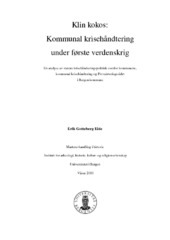Klin kokos: kommunal krisehåndtering under første verdenskrig. En analyse av statens krisehåndteringspolitikk overfor kommunene, kommunal krisehåndtering og Provainteringsrådet i Bergen kommune
Master thesis
Permanent lenke
https://hdl.handle.net/1956/4120Utgivelsesdato
2010-05-16Metadata
Vis full innførselSammendrag
Prosjektet undersøker hvilken forklaringskraft kommunal krisehåndtering under første verdenskrig har i forhold til relasjonen mellom stat og kommune, hvordan kommunene benyttet sitt handlingsrom og hvilke økonomiske forutsetninger kommunene opererte under i perioden 1914-1920. Ved å analysere statens politikk overfor kommunene, Provianteringsrådet og kommunal krisehåndtering i Bergen kommune, har denne studien bidratt til ny realkunnskap i basis med tidligere ubrukte kilder og samtidig utfordret tidligere forskning på kommunal historie i perioden 1914-1920. This master thesis examines experiments in state control in relations to crisis management by local authorities in Bergen during the First World War. During the war municipal offices were established and local authorities were given the responsibility of buying, storing, distributing and to organize rationing of a wide range of necessary consumption products such as food, fuel and firewood, as well as regulating the prices of these. Early measures were formed on a prediction that the war was to be brief. However, this prediction proved wrong. By 1916 the supply lines to Norway were heavily reduced, and the tasks of such municipal offices grew parallel with the shortage of food and the rising inflation. The subject municipal crisis management during the First World War has received little scholarly attention. Therefore, this thesis seeks to explain certain aspects of municipal history from 1914 to 1920 from the perspective of the Norwegian government's policy towards local authorities and the municipal crisis management which were carried out by local authorities in Bergen. Thus, the analysis generates new empirical knowledge about the subject, but also new understandings of municipal history between 1914 and 1920 by incorporating this perspective into the outlining of the relationship between state and communes and into the framework conditions of the communes methods of operation and their financial premises. Historians have claimed that the relationship between the state and communes could be described as Laissez Faire by arguing that the government rarely interfered with local authorities' methods of operation and that the growth of the communal budgets during the First World War were determinated by the communes' willingness to expand their activity through building electrical power plants and developing welfare procedures. As a result of completing the above procedure I leaned that the increase in communal budgets during the war could be explained by the strong inflation and by the expenditure to the actions of crisis management. Due to insufficient accounting during the war and inadequate information from the official statistics, which is often used by historians as a basis for empirical interpretation, the costs of the crisis management are not obvious. The analysis also finds that the state's mandatory measures directed to the local authorities proved costly for Bergen and many other communes. At the same time municipal socialists were trying to institutionalize these measures of state control in the attempt to build a platform to a socialistic society. Crisis management was supposed to be non-political and ad-hoc, but instead it early became a political question. Especially the local Labour Party in Bergen were a driving force and demanded communal efforts to protect the population from scarcity of food and rising prices.
Utgiver
The University of BergenOpphavsrett
Copyright the author. All rights reservedThe author
